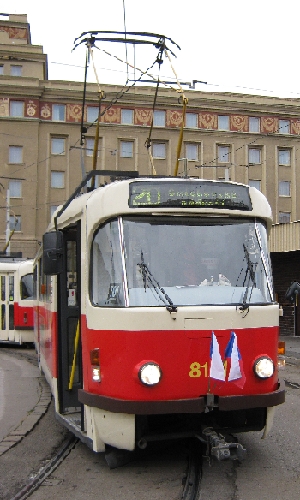 Knowing the dates of public holidays when you move to or visit a country of which you are not a native, is quite important as my wife and I found out only on Monday of this past week. We were returning from our trip to Turkey about which I’ve just started blogging, when we drove from Italy into Austria on the penultimate leg of our journey home to Prague. We were driving along the Austrian autobahn when my wife said, “Rather than stop at a service station for lunch, why don’t we drive into a nearby town and find a nice restaurant instead?”
Knowing the dates of public holidays when you move to or visit a country of which you are not a native, is quite important as my wife and I found out only on Monday of this past week. We were returning from our trip to Turkey about which I’ve just started blogging, when we drove from Italy into Austria on the penultimate leg of our journey home to Prague. We were driving along the Austrian autobahn when my wife said, “Rather than stop at a service station for lunch, why don’t we drive into a nearby town and find a nice restaurant instead?”
So it was that we drove into Spittal an der Drau and parked in the centre of the town. It was only when the parking ticket machine refused to accept my euro coins I tried to feed it, did it begin to dawn on me that the town was rather quiet. Then I noticed that all the shops and banks were also closed. We did eventually find a pleasant bar-restaurant that was open where I enjoyed a fine Wiener Schnitzel. Whilst there, we quietly enquired of the proprietor whether the day was by any chance a public holiday. “Of course”, came the reply. “It is the Austrian National Day.” Therefore beware if you ever have cause to be in Austria on 26th October. Most shops and businesses will be geschlossen!!
There are five public holidays annually which are peculiar to the Czech Republic. Each celebrates individuals or events that helped form the Czech nation.
5th July celebrates St. Cyril and St. Methodius, two brothers who lived in the ninth century and were responsible, both for bringing the Christian faith to the Czech and other Slavic peoples, but also for inventing an alphabet that allowed the Slavic language of the day, usually now known as ‘Old Church Slavonic’, to be written down for the first time. Whilst the Czech Republic is now seen as one of the most atheistic countries in Europe, these two Christian saints are still celebrated for being responsible for the origin of Czech culture.
28th September celebrates the patron saint of the Czech people, St. Wenceslas. He is believed to have been martyred on this day in 935. He is well known to English speakers because of the Christmas Carol ‘Good King Wenceslas’. The day is also known as ‘Czech Statehood Day’, no doubt because Wenceslas (Václav in Czech) is seen as an embodiment of the Czech state.
6th July is celebrated as Jan Hus Day. Hus was an early Church reformer calling for Church teaching and practices to be in line with what appeared in the Bible, for the Czech language to be used in liturgy and preaching and for the people to be able to receive Holy Communion in both kinds. He was excommunicated from the Roman Catholic Church in 1412 for insubordination and burnt at the stake on 6th July 1415. Once again, it is his desire for the use of the Czech language that has caused him to be celebrated more as a Czech cultural hero rather than as a Church reformer. The Communist government of 1948 – 1989 even tried to make him out to be a Czech proto-communist!
28th October marks Czechoslovak Independence Day. It celebrates the declaration of independence from the Austro-Hungarian Empire on 28th October 1918 by Czechs and Slovaks in the dying days of World War 1 and the establishment of what is now referred to as the ‘First Republic’ under the presidency of Tomáš Garrigue Masaryk. Although the state of Czechoslovakia ceased to exist on 1st January 1993 following the ‘Velvet Divorce’, the public holiday remains!
17th November is the most recent addition to the Czech calendar of public holidays and is officially known as ‘Struggle for Freedom and Democracy Day’. It marks the day in 1989 when students began demonstrations that led to the fall of the Communist regime and the successful ‘Velvet Revolution’. This year it will be especially celebrated being the twentieth anniversary of those remarkable events.

Tram with two flags © Ricky Yates
On all Czech public holidays, the Prague integrated transport system runs a Sunday timetable and trams and buses display two Czech flags at the front. Why two flags you may ask? The answer lies in the years of Communist rule. The Communists loved flags and insisted they were displayed on public holidays, not just on trams and buses but on a variety of buildings too. But the Czech flag could never be displayed on its own; it always had to be accompanied by the flag of the Soviet Union. Now this is no longer required, they just display two Czech flags instead!
This was my contribution to WBSD and I’m asked to link next to an expat blogger I know rather well, Hospitalera who blogs about ‘Christmas in Prague‘.
We are also being ‘Twittered’ by Karen and I’m asked to include the following about her. Karen is an American expat blogger last seen in Prague. The Wall Street Journal said, “Her blog makes a fun read for anyone looking for reassurance that change can be a wonderful thing–and also for anyone interested in visiting the Czech Republic.”



What a wonderful review of Czech history via your holiday list. Growing up in Czech I certainly remember the double flagging (Czech & Soviet), but I did not know they continued the tradition with two Czech flags. How funny!
Have a happy surfing :o)
An interesting post Ricky that reminds me how important this topic is. Fortunately I now have a calendar that shows all the holidays here, believe me there are a lot. I can also connect with the flag flying and now have two mini flagpoles in the garden to fly the relevant Thai flags (they just love them) on the appropriate days. I suppose it begs the question why so few people fly the flag back home?
Thanks, Ricky! A great overview of all of our days off here in the Czech Republic. 🙂
Yes, it’s very easy to get caught out by bank holidays as an expat. It’s especially confusing in Australia as some bank holidays are celebrated in some states and not in others!
Gosh – I can’t believe it’s nearly 20 years since the ‘Velvet Revolution.’ I remember watching it on TV and thinking just how historic and momentous an event it was. It’s interesting to hear how an extra Czech flag has replaced the Soviet one!
Fascinating, Ricky! Never knew about any of this, so general knowledge duly improved. LOVE the two-flags practice – a counterpoint of defiance, with wit and humour: does this represent an important element of the Czech spirit (I’m thinking of Sergeant Schwejk [sp?] among others …)?
It sounds like my kind of country – a public holiday almost every month!
Hi Ricky, love that British understatement about an expat blogger you know very well. This is such a great post since you are uniquely knowledgeable among expats to know this Czech church history. Thanks for participating in World Blog Surf Day!
That’s an interesting fact about the flags, it is strange how traditions develop sometimes.
BBE
What a great list of Czech holidays and celebrations! Which is your favourite?
an aside to Judy: check out Malaysia’s public holidays!
Hi Ricky,
What a great post–telling about Czech holidays!! I love it when the trams and buses have the flags on…it looks so very festive! Plus, it reminds me of home…at home on university games days, people have university flags on their cars…my alma mater is OU (Oklahoma University) :0)
Have a great day,
Sher :0)
I love learning about random things like why there are two flags on the trams! That would be one of those things I’d always wonder about and never have the courage to ask *L*
A big ‘thank you’ to all of you who have left comments.
Ivanhoe – I feel highly complimented by your expression of appreciation of my public holiday summary of Czech history from someone born in Czech lands. Very glad also to have confirmation of Czech/Soviet double flagging in the past. Displaying two Czech flags is the best way possible to say that post 1989, things here are different.
Mike – We have a calendar and an expats guide, both of which help us avoid the pitfall of not knowing when it is a public holiday. Regarding displaying flags ‘back home’ as you put it, I think you will find more flags on display in the UK now than in past times, either the Union Jack or the national flags of England, Wales or Scotland.
Sezin – Thanks! Due to WBSD I’ve found your blog and I’m looking forward to reading more of it over the next few days, especially your reflections about Turkey which I’ve recently visited.
Roz – Having lived in Australia, I know exactly what you are referring to. I worked for the Hobart, Tasmania office of a national company. I can remember several occasions when someone tried to phone the company head office in Sydney and got no reply because it was a public holiday in NSW! And beware, ‘bank holiday’ is a peculiarly British term, hence I’ve used ‘public holiday’ instead.
Yes – time flies. The fall of the Berlin Wall & the collaspe of communism in Central & Eastern Europe happened 20 years ago in 1989.
Minnie – ‘The Good Soldier Švejk’ (you can also spell it your way!) does encapsulate the Czech spirit of which the two-flags practice is a good example.
Judy – Yes there is just about one public holiday a month once you add in New Years Day, Easter Monday, Labour Day (1st May), Liberation Day (8th May) and Christmas Eve/Christmas Day/Boxing Day. I just chose to highlight those peculiar to the Czech Republic.
Karen – More a ‘careful statement’. Many people in the virtual world of the internet don’t know the connection between us!
BBE – see my earlier replies about double flagging
Lynne – I don’t know about my favourite but most Czechs like St. Cyril & St Methodius on 5th July & Jan Hus on 6th July. They have the making of a very good long weekend in 2010 when they fall on a Monday & a Tuesday!!!
Sher – I must say that I like the flags on the trams too – hence my photo. Congratulations on your brilliant organisation of Expat’s WBSD.
mub – thanks & see comments above about flags.
Great list, nearly a German sense of order is hovering over it 😉 For a freelancer like me, public holidays (bank holidays is pretty un-understandable for anybody outside the UK, I agree) are not really important, but I acknowledge that they are great when you are still a “corporate slave”, SY
You chose a very interesting angle for your post, Ricky!
Since I started working with expat clients two years ago, I have been learning a lot about public holidays all over the world… when setting deadlines and appointments by phone, we need to factor in not only the time difference, but also whether people will be in the office on the appointed day or not! The most confusing holidays are those that have the same name but aren’t celebrated on the same date, like Labour Day and Thanksgiving…
Emmanuelle
Update: Unfortunately I had to re-post my contribution on another domain and lost all comments already made on it, my apologies to everybody affected! SY
Yeaah, communists really loved flags, and some of these emotions still left in many post-communist countries like in Poland, but people are looking differently at this, more like being a patriot. when not hanging it from the window for example it means that you aren’t one.
Each country has some peculiar holidays. If you’re not accustomed to the culture of a country, you will find it really peculiar.
.-= Reise Laender´s last blog ..Rom =-.
The 5th and 6th of July look like they make a nice long weekend! I like the sound of St. Cyril and St. Methodius day. There is a bank holiday in Ireland that falls on my birthday and I quite like the idea of always taking a holiday on my birthday, but alas, I’m not Irish, or living in Ireland. Bit of a shame really.
Nice article Ricky, this isn’t the kind of information you can find easily. There are so many places I want to travel to and everytime I find articles like these I add another country! At least if I ever get the chance to travel to Czech Republic, I’ll now have an idea of what to do.